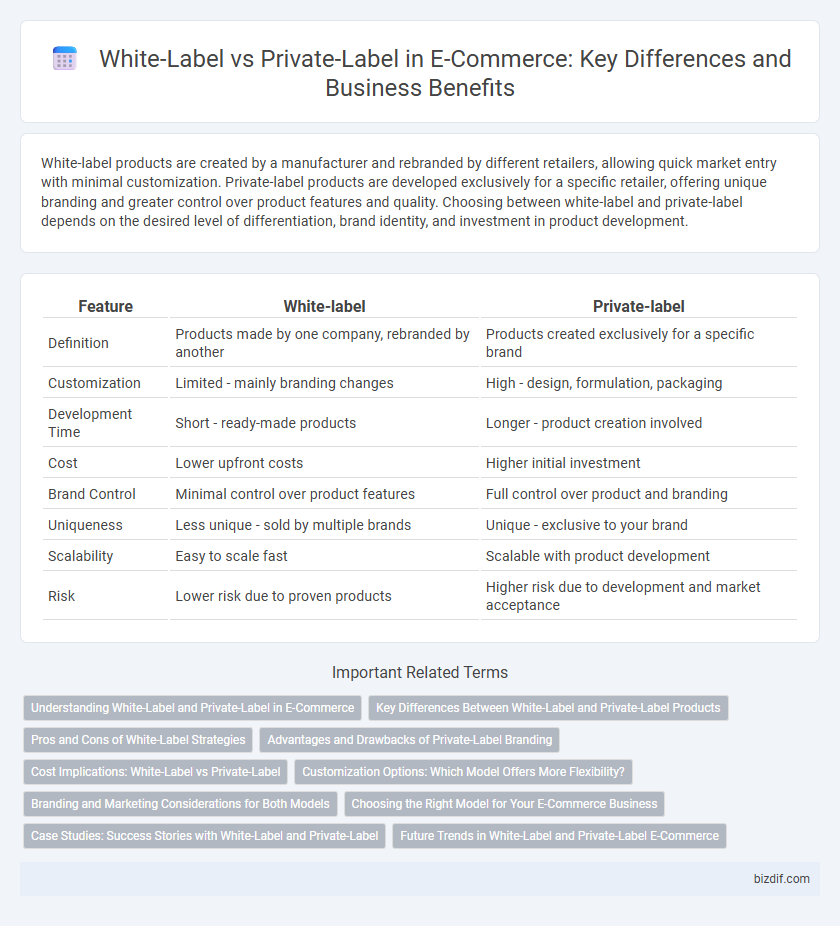White-label products are created by a manufacturer and rebranded by different retailers, allowing quick market entry with minimal customization. Private-label products are developed exclusively for a specific retailer, offering unique branding and greater control over product features and quality. Choosing between white-label and private-label depends on the desired level of differentiation, brand identity, and investment in product development.
Table of Comparison
| Feature | White-label | Private-label |
|---|---|---|
| Definition | Products made by one company, rebranded by another | Products created exclusively for a specific brand |
| Customization | Limited - mainly branding changes | High - design, formulation, packaging |
| Development Time | Short - ready-made products | Longer - product creation involved |
| Cost | Lower upfront costs | Higher initial investment |
| Brand Control | Minimal control over product features | Full control over product and branding |
| Uniqueness | Less unique - sold by multiple brands | Unique - exclusive to your brand |
| Scalability | Easy to scale fast | Scalable with product development |
| Risk | Lower risk due to proven products | Higher risk due to development and market acceptance |
Understanding White-Label and Private-Label in E-Commerce
White-label products in e-commerce are generic goods produced by one company and rebranded by multiple retailers, enabling quick market entry with minimal customization. Private-label products, however, are exclusively manufactured for a specific retailer, offering greater control over branding, quality, and product specifications. Understanding the distinction helps e-commerce businesses select strategies aligned with their brand identity and customer experience goals.
Key Differences Between White-Label and Private-Label Products
White-label products are generic goods produced by one company and rebranded by multiple retailers, allowing for broad market availability under different brand names. Private-label products are custom-made exclusively for a single retailer, offering unique branding and product specifications tailored to their target market. Key differences include brand control, product exclusivity, and pricing strategies, with private-label providing greater differentiation and white-label enabling cost-effective diversification.
Pros and Cons of White-Label Strategies
White-label strategies offer e-commerce businesses the advantage of quickly launching products without investing in research and development, enabling faster market entry and reduced upfront costs. However, these products often lack differentiation, which can limit brand uniqueness and customer loyalty compared to private-label alternatives. Dependence on suppliers for quality and inventory control poses risks, potentially affecting reputation and customer satisfaction.
Advantages and Drawbacks of Private-Label Branding
Private-label branding offers e-commerce businesses greater control over product quality, pricing, and brand identity, enabling tailored customer experiences and higher profit margins. However, it requires significant investment in product development, inventory management, and marketing efforts compared to white-label options. Risks include longer time-to-market, potential supply chain complexities, and the need for strong brand differentiation in competitive online marketplaces.
Cost Implications: White-Label vs Private-Label
White-label products typically involve lower upfront costs due to pre-manufactured goods ready for rebranding, minimizing production expenses and reducing time to market. Private-label products require higher initial investment in product development, customization, and branding, leading to greater control but increased cost risks. Businesses must balance cost efficiency with brand differentiation when choosing between white-label and private-label strategies in e-commerce.
Customization Options: Which Model Offers More Flexibility?
Private-label products offer greater customization options by allowing businesses to design and modify product features, packaging, and branding to a significant extent, tailoring the final offering to specific market needs. White-label products typically provide limited customization, as the core product is pre-made and shared among multiple sellers, with only minimal branding adjustments possible. For e-commerce retailers seeking unique differentiation and control over product attributes, private-label models provide enhanced flexibility and adaptability.
Branding and Marketing Considerations for Both Models
White-label products allow retailers to quickly enter the market with established items, minimizing branding efforts but limiting differentiation in marketing campaigns. Private-label brands offer full control over branding and product customization, enabling tailored marketing strategies that build unique brand identity and customer loyalty. Effective branding in private-label models demands investment in product design, packaging, and targeted promotional activities to distinguish from competitors.
Choosing the Right Model for Your E-Commerce Business
White-label products allow e-commerce businesses to rebrand ready-made items, enabling faster market entry with lower upfront costs. Private-label involves developing unique products exclusive to your brand, offering greater control over quality and differentiation but requiring higher investment and longer development. Selecting the right model depends on your business goals, budget, and desired level of product customization to maximize competitive advantage and customer loyalty.
Case Studies: Success Stories with White-Label and Private-Label
Case studies reveal that white-label e-commerce platforms, such as Shopify's ecosystem, enable entrepreneurs to quickly launch branded stores by leveraging pre-designed products, resulting in rapid market entry and reduced development costs. Private-label success stories highlight brands like Gymshark, which built strong customer loyalty and higher profit margins through unique product formulations and exclusive branding. These examples demonstrate that white-label suits scalable, fast-to-market strategies, while private-label excels in differentiation and long-term brand equity.
Future Trends in White-Label and Private-Label E-Commerce
White-label and private-label e-commerce are evolving with increasing consumer demand for personalized products and faster delivery options, driving brands to invest in advanced AI and data analytics to optimize customer experience and inventory management. Emerging trends include sustainability-focused product lines and enhanced customization features powered by augmented reality, positioning both white-label and private-label models as key strategies for market differentiation and consumer loyalty. Blockchain technology is becoming integral for supply chain transparency and authenticity verification, further shaping the future landscape of white-label and private-label e-commerce businesses.
White-label vs Private-label Infographic

 bizdif.com
bizdif.com